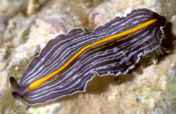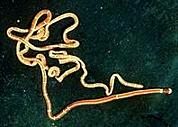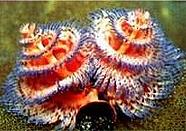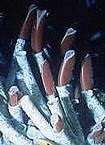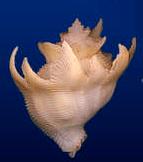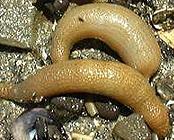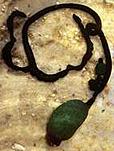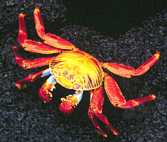Zoology 250 Phylogenetic Trees (2004)
========================== Platyhelminthes (flatworms, tapeworms,etc.
|
| ===(branch uncertain)== Aschelminthes (nematodes, rotifers,etc.)
| |
===P===| | ================ Nemertea (ribbon worms)
| | | |
| =1=| | ======= Mollusca (snails, clams, squids, etc.)
| | | ==3==|
| ===C===| | ======= Sipuncula (peanut worms)
| | |
<<=B=| B- BILATERIA | | == Annelida (segmented worms)
| | | =6=|
| P- PROTOSTOMIA =2==| =5=| == Pogonophora (beard worms, vent worms)
| S? | | |
| C- COELOMATE =4==| ===== Echiura (proboscis worms)
| PROTOSTOMES S? |
| ==7===== Panarthropoda (velvet worms, insects, spiders, crabs, etc.)
| S? ORIGIN OF
| SEGMENTATION?
================================= Deuterostomia (echinoderms, chordates, etc.)
Back to Zool 250 version of tree for animal phyla
TRAITS SUPPORTING EACH CLADE(** plesiomorphic- a primitive state, not unique to clade):
P (Protostomia):
a) spiral, determinate cleavage
b) mesoderm from single (mesentoblast) cell
c) fate of first derm cell set at 5th cleavage
d) mouth (and sometimes anus) from blastopore
e) sheets of sub-epidermal muscles
f) multiciliated cells
1:
a) anus present
b) circumpharyngeal ganglia
c) serial ventral nerve collaterals
d) paired gonoducts
C (Coelomate Protostomes):
a) coelom via schizocoely
b) trochophore-like larva with apical cilia
c) larvae swim with compound cilia
2:
a) larvae possess prototrochal cilia
b) entomesoblast cell yields paired coeloms
c) paired ventral nerve bundles
d) contractile dorsal vessel
3:
a) "molluscan cross" at 64-cell stage
b) scraping buccal organ *
c) muscular creeping foot *
* traits b & c are only present in Sipuncula larvae
|
4:
a) segmented coelom
b) pre-oral prostomium
c) anus-bearing pygidium
5:
a) "annelid cross" in 64-cell embryo
b) protrusible epidermal, chitinous setae in setal sacs
c) paired, ventral segmental nerves in larva
6:
a) fully segmented coelom & body wall muscles
(only seen in opisthoma of pogonophorans)
7 (Panarthropoda):
a) elongate body of multiple similar segments**
b) ventro-lateral legs (lobopods) with hooked tips
c) must molt to grow
d) chemical makeup of cuticle
e) ectodermal cilia lost
f) extensive hemocoel ('open' circulatory system), coeloms reduced
g) heart with openings to hemocoel (ostia)
h) panarthropodan sensilla
|
Return to Zool 250 Home Page or try your skill at the Invertebrate Diversity Quiz.
Copyright © 2004 by A. Richard Palmer. All rights reserved.
(revised Dec. 23, 2003)
